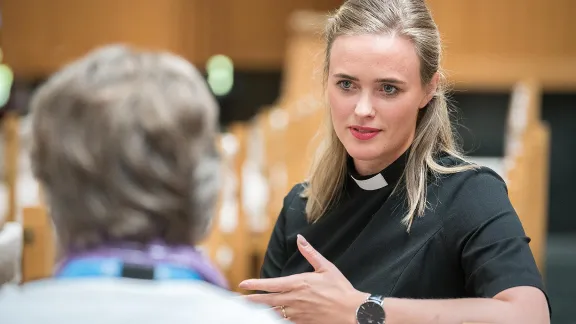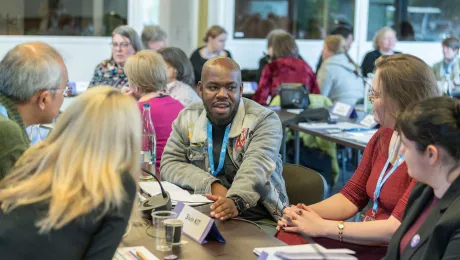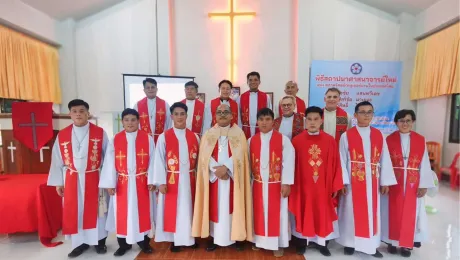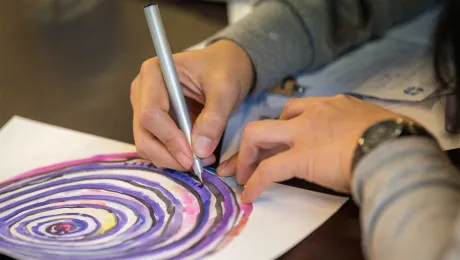
Thuridur Björg Wiium Arnadottir is one of the youngest Lutheran pastors, serving in The Evangelical Lutheran Church of Iceland. Photo: LWB/Albin Hillert
Working with youth, serving the world, from the northernmost corner of the Lutheran communion
(LWI) - At just 29 years old, Thuridur Björg Wiium Arnadottir is one of the youngest Lutheran pastors, serving in one of the most rural and isolated parts of the remote Nordic region. She lives in the small town of Vopnafjörõur, located on a rocky peninsula on the far north-east coast of Iceland, eight hours drive away from the capital Reykjavik.
She is convinced that the future is bright for the church in her country, which continues to serve people of all backgrounds and where religious traditions are still deeply embedded in the national sense of identity. She talks about her own faith journey and about what it means for young people to be Lutheran in Iceland today.
Give us as snapshot of church life in your own parish?
I live in a very small town of around 700 people and about 500 of them are members of our church, similar to the situation in the rest of the country. We have Sunday services every other week with an average of 70 people who regularly attend. Youth work is a very important part of my work, and around 95% of schoolkids come to church to be part of this. The kids are very honest and some say they don’t believe in God, but they want to come to church and we welcome everybody so they feel at home. I remember one day in the office, I felt hungry and went to the kitchen to find some snacks, but found the fridge empty. I thought about getting mad with the kids, but then I thought no; it’s good that they feel at home here and that they know the church will be here for them, whatever they need in the future.
What does it mean for them to be Lutheran in Iceland today?
It’s a good question and I’m not really sure they know what it means. I think for us, it’s a part of our nationality. Being a Lutheran, for most of us, is just something that we have been for hundreds of years, so I’m trying to teach them what it means today and what our role is as Lutherans, not only in Iceland but in the world.
Tell us about your own journey to ordination – did you grow up wanting to be a pastor?
Not at all. Growing up in this town, I attended church at Christmas and Easter but there wasn’t much for kids and I didn’t come from a devout family. I always knew I wanted to work with people, so I went to university to study social work, but I felt there was something missing and ended up in the theology department. I had no plan to become a priest but I got to know the church while studying and I saw both the importance of it and how much fun it is, how it touches on so many aspects of our life. I come from very musical family, I play the flute and studied singing, plus I like writing and reading so it all came together for me. I was ordained in November 2017.
You are the only pastor there, serving three small congregations – don’t you find it a daunting and sometimes lonely task for someone of your age?
It can be, because it’s a very isolated place, a couple of hours away from the nearest town. Social media helps of course as I can’t get away much. I am always at work, with just one weekend a month off. But being a Council member of the Lutheran World Federation (LWF) helps me a lot, it’s my way of connecting with the world.
Where do you draw strength from to deal with the difficulties you face?
I would say both from colleagues and also through prayer. My family is here and everybody knows each other, which has advantages and disadvantages! But we are missing one age group in my congregation, because after school in my town, almost everyone moves away to college, so we don’t have many people from 16 to 20.
Isn’t it hard to keep young people connected to the church then?
Most kids are baptized and most go through confirmation. I think that stays with them and when they go through difficulties it can help them. But a few are more committed, for example we have one 16-year-old girl in my congregation who is now an observer at our Synod. The younger kids are very active and love the church. Once a year, we have a friendship week where they focus on doing good things for their neighbours, helping out at local stores, or giving out hugs and putting up inspirational messages around the town. That’s one way of teaching them what it means to be a Lutheran.
Iceland is a rapidly changing society, from the traditional way of life in your remote part of the country to the more secular urban settings. What are the biggest challenges facing the church in this broader context?
Everything has changed a lot and the way people talk about religion is changing. The humanist groups are getting bigger, but that doesn’t affect the need for our services, as almost all weddings and funerals are still happening in the church. ELCI (The Evangelical Lutheran Church of Iceland) is the national church, so around 70% of people are still members, but our numbers are going down like most of the Nordic context. We continue to serve everybody though and we never ask people if they belong to the church or not. The church is very connected to people and society, so I think the future is bright.
Are there many people from other churches or faith communities?
In my town there are people that belong to the Catholic church and we have a Pentecostal church - I meet with their leaders every week and have good connections. In the ELCI we have a pastor for immigration who works with all refugees who come in and really helps people. I’d say the church is very welcoming and Christian traditions are still an important part of our culture. The government has just changed the rules for Christian holidays so now you can play bingo on religious holidays, which you couldn’t do before.
Is climate change an important concern for you too? Yes it is a key priority for the church, so we’re trying to find practical ways of expressing our commitment to that. Our bishop is driving an electric car and we recycle a lot, but we also preach about the importance of creation not being for sale. It’s very easy to talk about this because we’re aware of the changes, our glaciers are melting and it’s getting warmer.
You attended the LWF Council in June - what can you take back home from a meeting like that?
We can learn a lot from other churches, especially in the south where they are growing while we are shrinking. It’s especially important for us, who are so isolated, to be connected to the world, so being a part of what World Service is doing is a way for us to help and serve others.
The Lutheran World Federation is a global body that shares the work and love of Christ in the world. In this series, we profile church leaders and staff as they discuss topical issues and set out ideas for building peace and justice in the world, ensuring the churches and communion grow in witness and strength.


